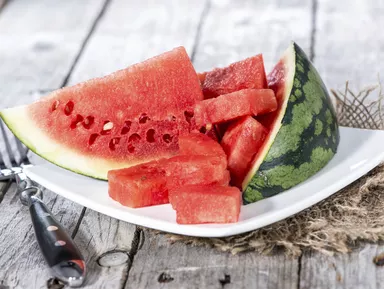The watermelon diet has gained some attention in recent times as a potential weight loss strategy. But what exactly is it, and is it a healthy approach? Here’s everything you need to know about the watermelon diet.
What is the Watermelon Diet?
The watermelon diet primarily consists of consuming large amounts of watermelon for a certain period. Some versions of the diet may allow for small amounts of other foods like leafy greens or certain fruits, while others are more restrictive and focus solely on watermelon. The idea behind the diet is that watermelon is low in calories and high in water content, which can help you feel full while consuming fewer calories overall.
Benefits of Watermelon:
Watermelon does offer several potential benefits. Firstly, it is extremely hydrating due to its high water content. Staying hydrated is essential for overall health and can help with various bodily functions, including digestion, circulation, and temperature regulation.
It also contains important nutrients such as vitamins A, C, and B6, as well as lycopene. Lycopene is a powerful antioxidant that has been linked to reduced risk of certain cancers and heart disease. Additionally, watermelon contains small amounts of potassium, which is important for maintaining healthy blood pressure.
Drawbacks and Risks:
However, there are significant drawbacks to relying solely on the watermelon diet. One major concern is that it is extremely restrictive and lacks variety. A balanced diet should include a wide range of nutrients from different food groups, including proteins, healthy fats, complex carbohydrates, and a variety of vitamins and minerals. The watermelon diet fails to provide many of these essential nutrients.
For example, it is very low in protein, which is crucial for building and maintaining muscle mass, repairing tissues, and supporting a healthy immune system. Without an adequate intake of protein, you may experience muscle loss, weakness, and a slower metabolism.
Moreover, the diet may not provide enough energy to sustain your daily activities. While watermelon does contain some natural sugars for a quick energy boost, it lacks the complex carbohydrates and healthy fats that can provide long-lasting energy. This can lead to fatigue, dizziness, and a lack of focus.
Another risk is that the diet may not be sustainable in the long term. It can be difficult to stick to such a restrictive eating plan, and once you return to a more normal diet, you may regain any weight lost during the watermelon diet. Additionally, yo-yo dieting can have negative impacts on your metabolism and overall health.
Is the Watermelon Diet Safe?
In general, the watermelon diet is not considered a safe or sustainable long-term weight loss solution. While watermelon can be a healthy addition to a balanced diet, relying solely on it can lead to nutritional deficiencies and other health problems.
If you are considering a weight loss plan, it is important to consult with a healthcare professional or a registered dietitian. They can help you develop a personalized and sustainable eating plan that meets your nutritional needs while also supporting your weight loss goals.
In conclusion, the watermelon diet may seem appealing due to its low calorie and high water content, but it is not a comprehensive or healthy approach to weight loss. It is important to focus on a balanced diet that includes a variety of foods to ensure you are getting all the nutrients your body needs for optimal health.

